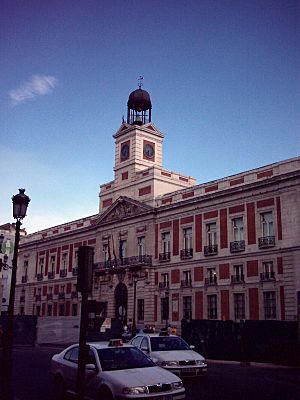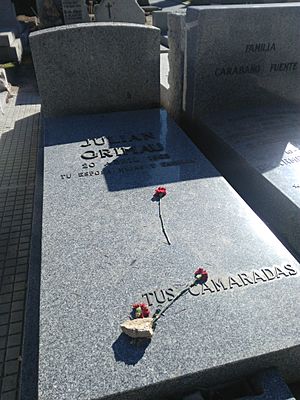Julián Grimau facts for kids
Julián Grimau García (born February 18, 1911 – died April 20, 1963) was a Spanish politician. He was a member of the Communist Party of Spain and was executed during the time of Francisco Franco's rule in Spain, known as the Francoist State.
Contents
Political Journey
Julián Grimau first became involved in politics with the Federal Republican Party and the Republican Left. When the Spanish Civil War began, he joined the Communist Party of Spain (PCE). During the war, Grimau was in Barcelona. He was in charge of a Republican prison there from 1937 to 1938.
After the Second Spanish Republic lost the war to Francisco Franco's forces in 1939, Grimau sought safety in other countries. He first went to Latin America and later settled in France.
Grimau became an important leader in the PCE. He joined the Central Committee after a big meeting in Prague in 1954. By 1959, he was in charge of the party's secret operations inside Francoist Spain. He lived secretly in Spain many times.
Grimau became one of the most wanted enemies of Franco's government. Many historians wonder why he returned to the capital in 1962, which led to his arrest. Some former PCE leaders have suggested that General Secretary Santiago Carrillo wanted Grimau removed from party leadership and might have helped his arrest happen in November.
Arrest and Injuries
Julián Grimau was caught in an ambush while riding a bus. The only other people on the bus were members of the Spanish secret police. He was taken to the General Security Directorate (DGS) headquarters in Puerta del Sol, Madrid. This building is now the seat of the Comunidad de Madrid administration.
While at the DGS headquarters, Grimau fell from a second-story window. He suffered serious injuries to his head and both wrists. He later told his lawyers that he had been hurt during questioning and that the police had caused his fall from the window.
The Trial
Grimau was not arrested for his secret political activities, which would have meant imprisonment. Instead, he was accused of more serious crimes related to his role in the Civil War, including "armed rebellion." Witnesses claimed he had been involved in harming prisoners in a secret prison in Barcelona. Some anarchists also accused Grimau of being a key member of the Republic's political police, the Servicio de Información Militar (SIM). They claimed he had hurt anti-Stalinist soldiers.
Normally, the laws for these types of charges had a 25-year time limit. However, an older law from 1894, with a 30-year time limit, was used instead.
Grimau's trial was held by a military tribunal. His prosecutor, Manuel Fernández Martín, had very little legal experience and had not even studied law. Grimau's defender, Alejandro Rebollo Álvarez-Amandi, was the only person with proper legal experience in the courtroom.
The trial began in Madrid on April 18, 1963. The courtroom was full of journalists. Grimau's lawyer argued that the trial should be stopped because it didn't follow the laws of the time. The accusations against Grimau were never supported by strong evidence. Witnesses for the prosecution said they only knew about his actions "by hearsay," meaning they had heard rumors that were never confirmed. After less than five hours, Grimau was sentenced to death without the judges even discussing the case.
The law used, called Ley de Responsabilidades Políticas ("Political Responsibilities Law"), was created in 1938 specifically to punish people who supported the Republic. It had not been used much since the years right after the war. Also, the government had just approved a new Public Order Tribunal on April 1, which was supposed to replace the older legal systems from the war. However, Franco himself ordered that this new law be delayed until after Grimau's execution.
Global Protests
Spain had been trying to show the world that it had moved on from the Civil War. But Grimau's trial showed otherwise. People around the world, especially on the political left, protested. Newspapers wrote articles supporting him, and many rallies took place in cities across Europe and Latin America.
Workers in several ports refused to unload cargo from Spanish ships. More than 800,000 telegrams were sent to Madrid, asking for the trial to be dismissed. However, Franco believed there was a "freemason-leftist conspiracy against the political establishment."
The trial happened at the same time a Spanish black comedy film about the death penalty, Not on Your Life, was shown at the Venice Film Festival.
After the court's decision, the only way to save Julián Grimau was for Franco himself to change the sentence to a prison term. Many world leaders appealed to Franco, including Pope John XXIII and Soviet Union leader Nikita Khrushchev. This was a very unusual event, as it was the first time a Soviet politician had contacted the Spanish State. People within Spain also asked for clemency (mercy).
The Spanish government met on April 19 for ten hours. Although Fernando Castiella, the minister of foreign affairs, was in favor of pardoning Grimau to protect Spain's image, his opposition was not strong. Franco insisted on a vote, and the final decision was unanimous for Grimau's execution.
Death
The firing squad that was supposed to execute Grimau was made up of Guardia Civil members. However, they refused to carry out the order, saying it was not their responsibility. The Madrid captain-general, likely on direct orders from Franco, then called for volunteer soldiers, who carried out the execution.
Julián Grimau was buried in Madrid's civil cemetery.
Legacy and Efforts to Clear His Name
After Spain's transition to democracy began in 1975, it became possible to look into how Grimau and other political prisoners were treated. However, agreements made at the time, like those in the Palacio de la Moncloa, created a kind of "moratorium" or pause. This meant there was a general agreement to try and forget the crimes of Franco's rule and the legacies of the Republic and the Civil War.
In the 1980s, there was a discussion in the Madrid City Council about renaming a street "Julián Grimau," but the idea was rejected. Today, several streets and public buildings in Spain are named after Grimau.
In the 1990s, public discussion about the fate of Franco's opponents became more common. The Izquierda Unida political group, which the PCE joined, made many attempts to clear Grimau's name. On April 15, 2002, Izquierda Unida proposed to the Cortes Generales (Spain's parliament) that Grimau should receive a "public and democratic exoneration," meaning his name would be officially cleared. All parties supported this idea except for the conservative People's Party (PP). Since the PP had the most votes, the proposal did not pass. The PP argued that it went against the earlier agreement to forget the past.
In May 2005, Izquierda Unida tried a similar process in the Community of Madrid Assembly, but the PP, which was the majority party there, blocked it again.
Grimau's death has been the subject of songs by several artists, including Violeta Parra, Thanos Mikroutsikos, Léo Ferré, and Gianfranco Molle.
Grimau's daughter, Dolores, married the writer and professor Gonzalo Santonja.
See also
 In Spanish: Julián Grimau para niños
In Spanish: Julián Grimau para niños
- List of people executed by Francoist Spain
- Tribunal de Orden Público
- Paul del Rio



